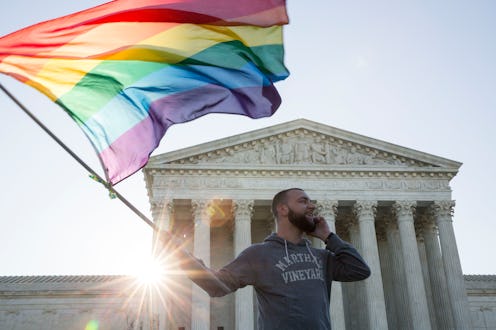News
The SCOTUS Marriage Ruling You Might Not Expect
The fervor is deafening and the country is growing impatient. With a same-sex marriage ruling due to be handed down by the Supreme Court any day now, most experts and all those in the know have predicted a favorable outcome for the LGBTQ community — but not everyone is positive that will happen. And according to one University of California law professor, there's one gay marriage SCOTUS ruling we haven't been expecting that we probably should be prepared for.
That third, less appealing option, UCLA's Adam Winkler told Business Insider on Tuesday, has nothing to do with sweeping decisions or crushing defeats — it has everything to do with the minutiae that comes with a court case as momentous as the Obergefell v. Hodges file currently sitting before the nine Supreme Court justices.
"The court could hold that it is unconstitutional to deny LGBT couples all the rights and privileges of marriage without requiring states to allow them to marry," explained Winkler, elaborating on the notion that states would likely be forced to establish concrete civil union measures affording same-sex couples all the rights that come with a traditional marriage, something that they currently do not have. Despite that change, he added, it would leave many LGBTQ rights advocates disappointed.
If the Court rules against same-sex marriage, argued Cornell University law professor Michael Dorf, in a comment to the Star Tribune on Tuesday, the ramifications would likely go far beyond what proponents feared most, considering the previous actions of already-reluctant states like Alabama, which effectively ignored a federal order to allow same-sex couples to obtain marriage licenses in March.
"That state can immediately start saying 'We're going to deny marriage licenses to same-sex couples going forward,'" explained Dorf, who told the publication that the likelihood of officials being able to "resume reinforcement" of current standards was slim. Too many of those states, he added, would be willing to fight for anti-LGBTQ measures.
Currently, the Supreme Court has been asked to identify whether marriages performed in one state ought to be recognized in another. As Business Insider pointed out on Tuesday, they have also been asked to deliberate over whether bans on same-sex marriage in four states violate the 14th Amendment, which declares that U.S. citizens must be afforded equal protections and rights under the law of the land, as petitioner Jim Obergefell has asserted.
Obergefell, who was married to husband John Arthur for just over three months before Arthur passed away from ALS, has claimed that the state of Ohio had no legal or constitutional bearing to take his name off of his husband's death certificate, which they did in 2013 following a lengthy appeals process against the 48-year-old real estate broker.
"It's hard to put into words how to grasp that our decision to stand up and say, ‘This isn’t right,’ is going to affect so many people," said Obergefell in an interview with The Washington Post's Michael S. Rosenwald back in April.
As the nation waits with bated breath to find out just which way the Supreme Court will swing, one thing is certain: to break down the case by the statistical likelihood of one ruling over the other would be to smother the real reason the case was lodged in the first place.
Anything less than a favorable outcome, including a half-hearted effort to afford same-sex couples identical rights, will stamp out the voices of those who have pushed this far, not to win on technicalities, but to continue the forward progress of human rights in the United States.
Images: Getty Images (2)
